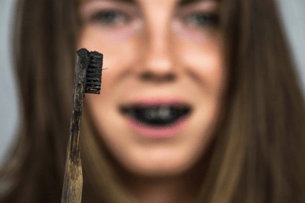
Millions of people strive every day to have a brighter, whiter and healthier smile. And in that quest to get the whitest teeth possible, it seems that people are willing to try just about anything to whitening their yellow, discolored teeth.
One of the most popular methods in teeth whitening is the use of chalky, ashy charcoal as an at-home, teeth-whitening remedy.

Advocates for the chalky, black powder – which most of us know from its use on our barbecue grill - say that activated charcoal can be very effective as a “natural” teeth whitener. You can now find charcoal toothpastes and charcoal powders on the shelves of drug stores and markets, with many brands hoping to cash in.
But what are many of the experts saying? Well, charcoal has been for a variety of medical reasons since ancient times and we certainly know that the use of charcoal is widespread as a means to purify water, but is there any real scientific basis for its use as a way to whiten teeth?
Charcoal can help to absorb toxins, bacteria and stains on your teeth, but many dentists are warning that there is a danger of irreversible side-effects when used over a long period of time.
In a recent article, Gigi Meinecke, a spokesperson for the Academy of General Dentistry was quoted as saying this of charcoal as a teeth whitener: “You’ll probably get the same whitening results using a natural toothpaste, without the hazards.”
And a 2017 Men’s Health article – Activated charcoal could be doing your teeth “more harm than good” included a statement from the ORAL HEALTH FOUNDATION in the U.K. that warned users that the charcoal’s whitening effects may be overstated and that brushing with it could actually put the health of your teeth in danger. This same article cited research from the Journal of Physics: Conference series found that brushing with activated charcoal may do just the opposite of its intended use by increasing the roughness of the tooth enamel making it easier for bacteria and discoloration to stick to the surface.
Some of the potential hazards of Charcoal as a teeth whitener:
- Charcoal is very abrasive and it could do significant damage to the enamel of your teeth over time, absorbing into the thin outer layer of your teeth and into the enamel.
- As a abrasive substance, it could work unevenly on the teeth, creating blotches and uneven patches of color.
- Since our teeth and gums are very susceptible to erosion, excessive use over time of charcoal could lead to teeth sensitivity or infections in the gums.
- Since charcoal is so absorbent, if you end up swallowing enough of it, it could render some medications ineffective.
- And while it may not be enough to cause a real problem with limited use, charcoal if ingested over a long period of time, could cause stomach and digestion issues, such as colon inflammation.
- It also happens to be EXTREMELY MESSY and can create stains.
So, while alternative products such as charcoal may work for some in the short term, do your due diligence and research. Check with your dentist and only use trusted products that have been tested, and that are proven safe and effective.
To help you get brighter, whiter teeth, we suggest using a time-tested, customer favorite like the line of GOSMiLE teeth whitening products. GOSMiLE products use Hyperox™ Technology in all of their whiteners which maximizes the speed and efficacy of the hydrogen peroxide to quickly give you your whitest smile. And a study at Columbia University reported virtually no sensitivity in GOSMiLE clinical trials.GOSMiLE products are safe to use on all teeth, including braces, fillings, crowns and veneers.




